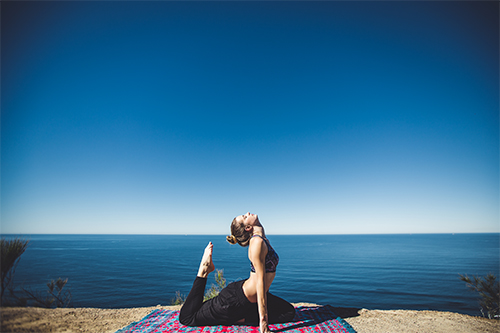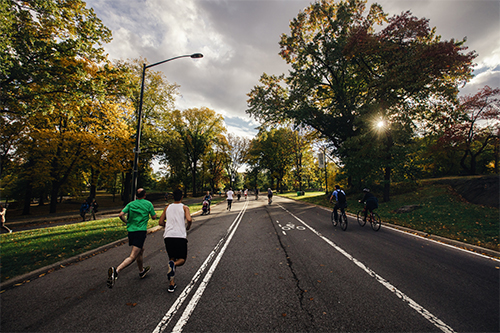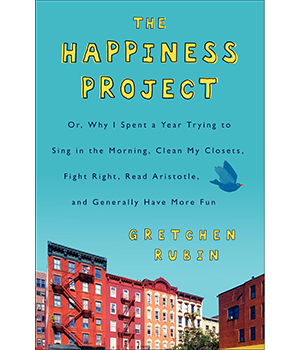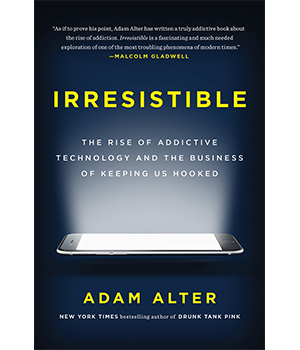We lead stressful lives these days, and it only builds as mobile devices increasingly demand our time, working hours never seem to end, family responsibilities continue to grow, and health issues require attention.
Stress isn’t just unpleasant though — it can wreak havoc on your body and your health.
Dr. Justin Levisay, cardiologist at NorthShore University HealthSystem, explains, “Stress involves a series of hormonal responses including cortisol and adrenalin. When facing a stressful situation, more glucose is released into the blood stream and blood pressure and heart rate increase. This can be good if you need the body to react quickly to imminent danger.”
But, most of time, we’re not facing life-or-death situations even though we’re making our bodies feel like they are, and this is bad news.
“Chronic stress is harmful to your health,” Levisay says. “Stress has been linked to heart disease, diabetes, premature aging, obesity, and premature death, just to name a few.”
Could you use some help controlling your stress? Whether you have only a minute or a full day, here are some simple ways to decompress and re-center yourself so that you have renewed calm and energy to face the day.
Have 1 Minute?
Breathe
When faced with a stressful situation, using your breath can help you relax and function more effectively. Whether your stress is related to a parking ticket, a fight with your spouse, an hour wait at the doctor’s office, or your child’s failed test, using your breath can help you deal with the issue. Neely Benn, clinical social worker at NorthShore University HealthSystem, suggests developing a routine of breathing exercises for times of acute stress.
“By focusing on the breath, you will slow your heart rate, lower your blood pressure, think more clearly, and increase the oxygen flow to your body,” Benn says. “Breathe in for a count of four, hold for four, then breathe out for a count of eight. Alternatively, take a nice deep breath and think in as you breathe in, and out when you breathe out.”
Practice these simple breathing exercises during non-stressful times, and be ready to put them to action when faced with acute stress.
Have 5 Minutes?
Journal
Gretchen Rubin, author of the New York Times best-seller “The Happiness Project,” says, “When we write down our worries, we gain perspective and a feeling of control. Writing things down tends to quiet the brain. You won’t keep going over and over the anxieties in your head because they are memorialized on paper. Writing down happy or funny thoughts helps you focus on the positive aspects of your day.”
Record your thoughts in Rubin’s blue journal or a small notebook and place it on your bedside table. Journaling will allow you to let the tough things rest for the night, and acknowledge gratitude for all good things.
Have 10 Minutes?
Meditate
Meditation is a practice that can quiet the thoughts in your head, prevent depression, limit stress, reduce anxiety and ultimately make you a happier person. Meditation can be as simple as focusing on the breath, a few positive words, or progressively relaxing each part of your body. Several recent studies from a Harvard University neuroscientists demonstrate that meditation can even increase the gray matter in the brain leading to improved memory and decision-making, fighting some of the effects of aging.
Levisay took a transcendental meditation class to learn how he could best function, given his stressful job as a heart surgeon. He finds meditation calming and it allows him time to find clarity and focus for all the important things in his life.
Find a meditation teacher and commit to a weekly class. Several meditation applications, like Headspace and Calm, make it easy to try meditation at home and develop a regular practice.
Have 15 Minutes?
Walk
“Physical activity reorganizes the brain so that its response to stress is reduced and anxiety is less likely to interfere with normal brain function,” according to a study from Princeton University.
Walking, like other physical activity, provides a protective mechanism in the form of calming neurons. Take a break from your stress and go for a vigorous 15-minute walk outside, down the halls of your office or even on the treadmill. Your brain, on a little exercise, will recover and allow you to get back to business.
Have 30 Minutes?
Practice Yoga

Yoga’s ability to blend your body and mind is a form of meditation that can work wonders on your stress levels when practiced regularly.
“It’s remarkable what a difference just 30 minutes of yoga can do to help your body and soul feel nourished and optimize your energy flow,” says Amy Ippoliti, acclaimed yoga teacher with yogaglo.com. “When you change your state like this, it’s not that stress will necessarily ever go away. However, you will be able to respond more calmly to daily stress. Even a short practice can change the course of your day and help you think more clearly.”
Commit to a regular weekly class at your local studio and work toward a shorter, daily practice to benefit your body and your mind.
Have 45 Minutes?
Get Creative

A recent study demonstrated that 45 minutes of doing artwork significantly reduced the levels of cortisol, the stress hormone, in the body. And you don’t need to be an artistic genius just to express your creative side.
“Creating art has the inherent ability to decompress the mind and body, while making powerful statements about the way we see the world,” says Cara Feeney, manager of exhibitions at Evanston Art Center. “We value and encourage artistic expression of all forms and abilities.”
Try a beginner class in drawing, painting, ceramics or photography. Alternatively, adult coloring books are another great option to let your creativity flow.
Have 1 Hour?
Exercise

“There are two primary ways exercise can reduce stress,” says Pete McCall, spokesperson for the American Council on Exercise. “First, exercise is physical stress applied to your body, increasing levels of stress hormones and increasing heart rate to pump blood to the working muscles. Regular exercise provides long-term adaption-maintaining control of heart rate and other systems in response to stress. High-intensity workouts help your body adapt, reducing the effects when stress happens at work or at home.
“Second, exercise provides a short-term response by releasing energy and instilling a sense of well-being. Throwing a medicine ball or sandbag can be a great way to release stress through explosive muscle actions.”
There is nothing like the relaxed feeling throughout your entire body after a super-hard workout. Find exercise that you enjoy and that is accessible. Vigorous walking, running, swimming, a HIIT class, cycling, dance class, strength training, or boxing are all great choices.
Have 4 Hours?
Go Outside

Studies continually prove that time in nature reduces stress. A recent study out of Stanford University demonstrated that a walk in nature reduces the participant’s likelihood to ruminate over the various stresses in their life. Rumination is a precursor for depression and other mental illnesses. Humans are naturally designed to find trees, plants, water and wildlife engrossing, and exposure to nature naturally becomes the 100-percent focus, despite your life situation. After a busy week, plan an outing to the Chicago Botanic Garden, Morton Arboretum, or take a hike at Kettle Moraine State Park. Regular exposure to nature will help keep your stress in check.
Have 1 Day?
Take a Break
Allow one day a week to take a complete break from technology: phones, tablets, laptops, desktops, television, video games and any other technical gadgets that are an integral part of your life.
“Technology induces stress because it demands our attention in the same way that, say, an insistent boss demands our attention,” says Adam Alter, best-selling author of “Irresistible” and associate professor of marketing at New York University’s Stern School of Business. “With push notifications, phones dictate when we’re supposed to pay attention to them. We give them the sort of power that we’d never give to another person — the power to interrupt us whenever they like. And when we do ignore them, we know there’s a chance we’re missing out on something because the online world changes 24 hours a day.”
Pick a weekend day and let others know you are off your devices. Encourage a friend or other family members to join your break from technology. Use the time to read Alter’s book (the paper form) and understand how technology is impacting your thoughts, feelings and actions. Notice how much time you have available when technology isn’t demanding so much of it!
Stress is a part of life, but it shouldn’t overwhelm your life. Adopt one or more of the above strategies to help you manage, reduce, and even eliminate some stress. Your health depends on it!

Christy Coughlin is focused on sharing her passion for healthy living through her writing and coaching. She has a back-to-basics approach based on real food, sensible fitness, and behavior modification. Christy has been a contributor to Make it Better for eight years, focused on, you guessed it, health and fitness. As an ACE certified personal trainer, she has worked with athletes of all ages and abilities, for nearly 20 years. Christy especially enjoys encouraging women to add “a little running” to their fitness program through her Real Running group program. Christy loves to stay fit on the lakefront, doing yoga, running, paddling and swimming.



